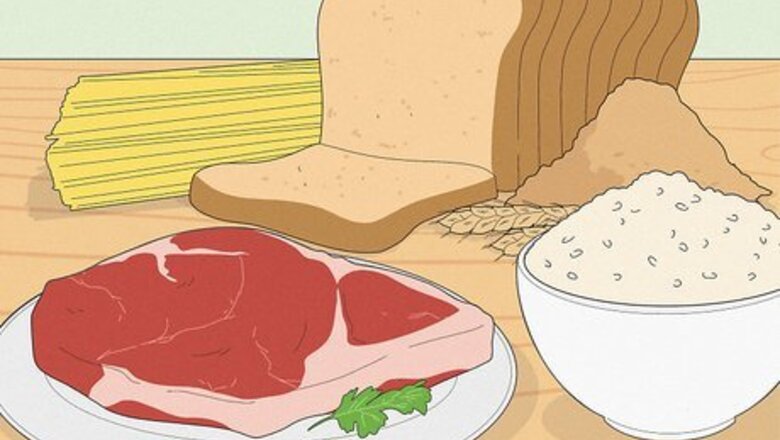
views
X
Trustworthy Source
Harvard Medical School
Harvard Medical School's Educational Site for the Public
Go to source
The main way to gain weight is to consume more calories than your body burns, but this isn't always as simple as it sounds. Read on to learn how you can decrease your metabolism and put on a few healthy pounds.
- Eat more calories than you burn if you want to gain weight. Aim to add a total of 300 to 500 calories per day above what you normally eat.
- Choose foods that are high in healthy fats and carbohydrates, such as rice, pasta, and red meat. Snack on nuts and seeds, as well.
- Use relaxation techniques such as meditation to cope with stress. More quality sleep can also bring your metabolism down and help you gain weight.
Eat food that is high in calories.
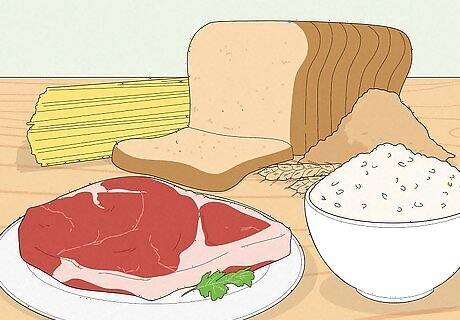
Gain weight by eating more calories than your body burns. Regardless of your metabolic rate, you're not going to gain weight unless you're consuming more calories than your body needs to function. This is one of the reasons why knowing your BMR is extremely important. Without that number, you have no way of knowing how many calories you should be eating on a daily basis if you want to gain weight. Certified nutritionist John Burson notes that "foods high in refined or processed sugar, saturated fat, and simple carbohydrates" tend to slow down your metabolism. At the same time, these foods often aren't your healthiest options (think candy bars and sugary soft drinks), so you should still consume these foods sparingly. Instead, focus on foods that are rich in carbs, such as rice, bread, and pasta, along with foods high in fat and protein, such as red meat, salmon or oily fish, and higher-fat dairy products. Meats that are higher in fat, such as steak, pot roast, pork chops, and chicken or turkey thighs are also good choices if you're trying to gain weight.
Boost your caloric intake at each meal.
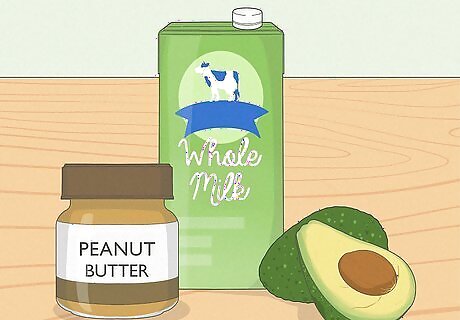
Use high-calorie drinks, sauces, and spreads to add calories. High-calorie drinks, spreads, and sauces are a great way to add a few calories to your meal. This is especially helpful if you're someone who doesn't have much of an appetite or feels full quickly because they're not going to weigh down your meal. For example, you might have a glass of whole milk with dinner instead of water. You might also add condiments that are high-calorie and rich in healthy fats, such as avocado, chopped nuts or seeds, olive oil, shredded cheese, or hummus. As a general rule, think about adding a total of 300 to 500 calories a day to what you normally eat. This will help you gain weight in a healthy way.
Eat several small meals throughout the day.
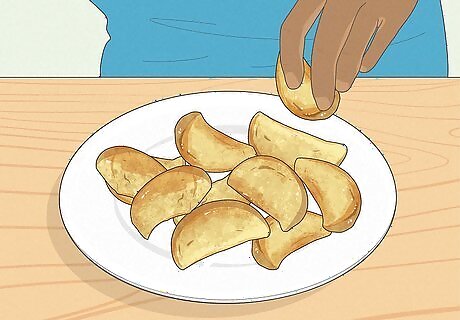
Be prepared to eat even when you're not hungry. If you struggle with appetite, the idea of sitting down for a huge meal might sound like torture. But having 5 or 6 meals a day (instead of the usual 3) gives you more opportunities to get those calories in. Even if you're not hungry, having a few bites of something will at least feed your body a few more calories, which you'll need if you're looking to gain weight. If a lot of small meals aren't feasible for you, try eating slightly larger servings of each thing on your plate during regular meals.
Snack on nuts and seeds between meals.
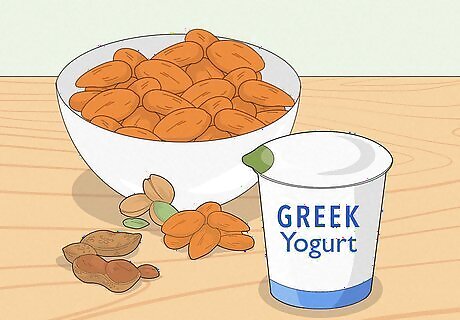
Nuts and seeds tend to have the most calories per ounce. High-calorie snacks between meals will certainly help you gain weight. But you don't want to just eat junk food! High-calorie foods that are also rich in protein, such as nuts and seeds, can help you gain weight healthily. Nut butters are also a good choice! For example, you might have a peanut butter sandwich or peanut butter crackers for a snack. Eggs and Greek yogurt are also good snacks. For example, you could make deviled eggs or mix a handful of nuts and seeds into a cup of Greek yogurt.
Limit fluids 30 minutes before meals.
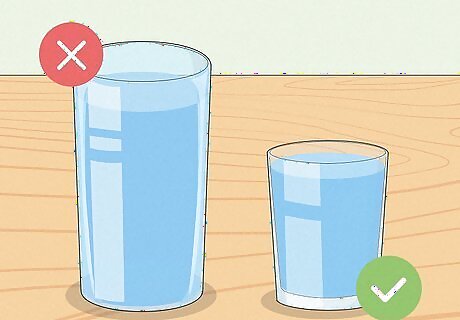
Drinks can fill you up so you don't eat as much food. This is especially helpful if you don't have much of an appetite or tend to fill up quickly. When you drink water or other beverages within a half hour of eating, they can make you feel full. The result? You'll end up eating less food and won't get the calories you need. Drink small glasses of water throughout the day so you stay hydrated, just taper off before mealtime.
Manage your stress levels.

High stress levels can make it difficult to gain weight. It's not uncommon to lose a lot of weight in the aftermath of an extremely stressful event, such as a divorce or job loss. Often, your weight will return to normal once the stress eases up—but that doesn't always happen. Here are some things you can do to help decrease stress: Meditate Write in a journal Spend time with family and friends Go for a walk in nature
Stick to low-impact, low-intensity exercise.
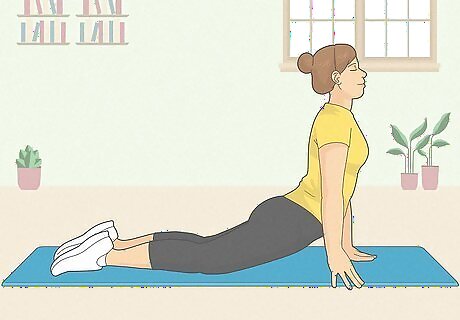
Exercise that's too intense burns too many calories. Many people who are trying to gain weight are afraid to exercise because they believe it will cause them to lose weight—and that can happen. The key is to avoid intense exercise sessions in favor of low- to moderate-intensity exercise that keeps you healthy and physically fit without impacting your metabolic rate too much. For example, you might try yoga for strength training and go for a walk for 30 minutes each day. Exercise can also help boost your appetite, if that's a problem for you.
Limit your intake of caffeine.
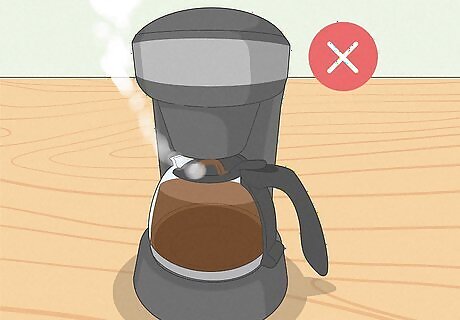
Caffeine is a stimulant that can increase your metabolism. Studies show that drinking a beverage with caffeine can significantly increase your metabolism for up to 3 hours afterward. If you're drinking coffee or tea throughout the day, this could be one of the reasons you have a hard time gaining weight. Stick to coffee in the mornings, if you must—avoid it in the afternoon or evening, especially close to bedtime. It can interfere with your sleep patterns, which can also mess with your metabolism.
Avoid going out of your way to be active.
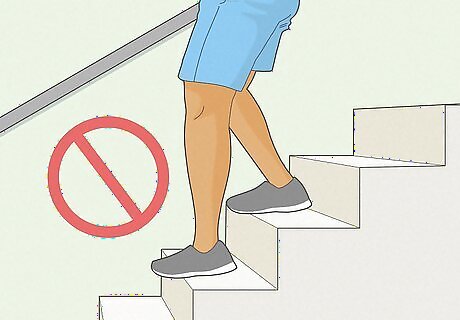
Burn fewer calories by living a more sedentary life. You've probably heard that a good way to lose weight is to squeeze activity into your daily life, such as by taking the stairs instead of an elevator. Being more active increases your metabolism a bit and causes your body to burn more calories for energy. But if you're looking to gain weight, go ahead and take that elevator! A little less activity can help lower your metabolism. At the same time, you do want to stay healthy, and being active is a great way to do that. So while you don't necessarily want to lay on the couch all day, it's always good to take shortcuts where you can if you're trying to lower your metabolism and gain weight. For example, you might drive to a store that's less than a mile away instead of walking, then search for a parking place as close to the entrance as possible. If you have a job where you're on your feet a lot, this can also cause you to burn more calories and have a higher metabolic rate than someone who spends most of their workday sitting at a desk.
Stay comfortably warm.

Dress so that you aren't cold but also not overheated. When you're slightly cold, your body has to burn more calories to stay warm. But if you're too hot, on the other hand, your body will burn calories to cool off. What you need is a happy medium where you're neither too cold nor too hot, which will keep your metabolic rate as low as possible. This is especially important while you're sleeping. Make sure you have several layers of light blankets on your bed so you can adjust as necessary. When you're out and about during the day, wearing several layers will help you control your body temperature inside and outside without expending too much energy.
Sleep at least 7 hours a night.
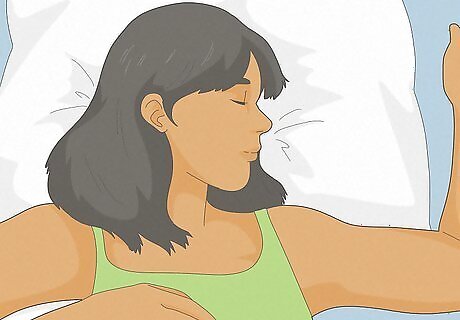
During sleep, your metabolism decreases by around 15%. Getting enough quality sleep is essential for your overall health, but it's even more important if you're trying to adjust your metabolism or gain weight. If you don't get enough sleep, your appetite and metabolism might be disrupted. If you have a sleeping disorder that negatively affects your sleep, talk to your doctor. Medications and assistive devices might help you get more restful sleep. Practice good sleep hygiene by going to bed at the same time every night and doing something relaxing for about an hour before you fall asleep. Reading a book or taking a warm bath or shower will also help your body slow down and prepare for sleep.
Take naps during the day.
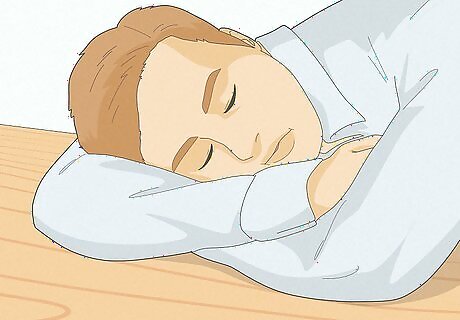
Take advantage of lower sleeping metabolism through quick naps. When you're sleeping, your metabolism is about as close to your BMR as it can get. This means if you have the opportunity to take a short nap (under 30 minutes) or two over the course of the day, you could lower your overall average metabolic rate for the day. Even if you're not a napper, simply relaxing and doing something passive, such as watching TV or reading a book, can lower your metabolic rate a bit (though maybe not as much as when you're sleeping). Keep in mind that there's not necessarily a rule that says you have to get all the sleep you need at one go either. If you have trouble sleeping at night for an extended period, a couple of naps throughout the day might help you ensure you're getting as much sleep as you need.
Get tested for a hormonal disorder.
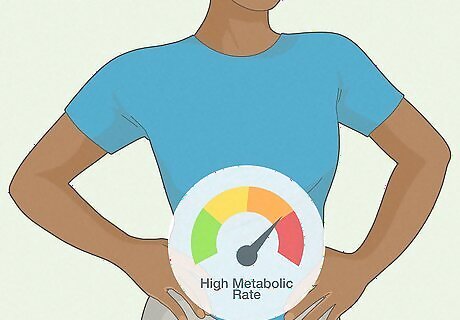
Talk to your doctor if you think your metabolic rate is abnormally high. Because metabolic disorders share symptoms with other disorders and conditions, specific medical testing is required. One of the most common hormonal disorders that raises your metabolism is hyperthyroidism, which can also be a symptom of other medical conditions. Your doctor will request tests to determine your basal or resting metabolic rate and order further tests if it's significantly high. Your basal metabolic rate (BMR) reflects the amount of energy your body needs to perform its basic functions. This makes up anywhere from 50 to 80% of the energy your body uses on a daily basis and you can't really adjust this up or down very much. Genetic disorders can also cause abnormally high metabolic rates. These disorders are usually manageable under medical supervision.
Try a supplement to boost your appetite.
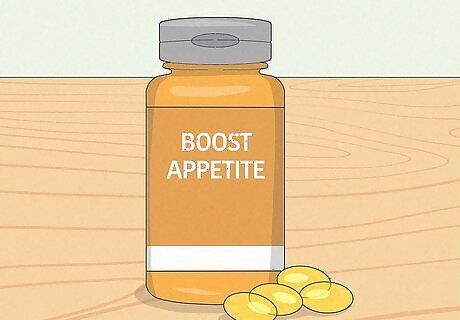
If you seldom get hungry, an appetite stimulant might help. Talk to your doctor about appetite stimulants, many of which require a prescription. These drugs can boost your appetite so that you'll be hungry more often and eat more food. They're typically prescribed if you're recovering from a recent health crisis, such as cancer, that causes a loss of appetite. Avoid products that claim to build lean muscle or increase muscle mass. None of these products' claims have been scientifically proven.
Quit smoking.
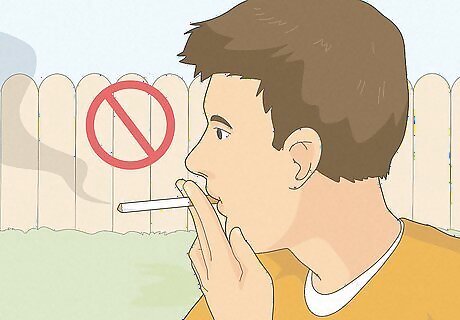
Nicotine can raise your metabolism. If you're trying to decrease your metabolism, smoking or vaping won't do you any favors. When you quit feeding your body nicotine, your metabolism will typically lower quite a bit—this is one of the reasons many smokers gain weight after they quit. Keep in mind that it's not the act of quitting smoking that causes you to gain weight. It's because you continue to eat the same as you did before you quit, when you had a higher metabolism.




















Comments
0 comment